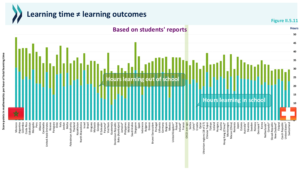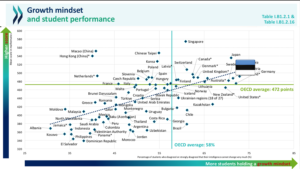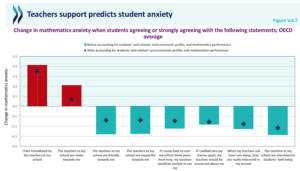The PISA report (Programme for International Student Assessment) is widely recognized as a tool for measuring academic performance on a global scale, focusing primarily on quantifiable results such as skills in mathematics, reading, and science. However, focusing solely on numbers can overlook other essential factors for understanding how and why students learn.
The so-called “hidden curriculum” refers to those attitudes, values, and skills that students acquire in the school environment but are not explicitly assessed in standardized tests. It includes aspects such as growth mindset, intrinsic motivation, sense of belonging, perception of teacher support, and the ability to face challenges. These elements, though difficult to measure, are key to deep learning and the holistic development of students.
In his address at the World Schools Summit 2024, Andreas Schleicher highlighted the importance of these less visible aspects of learning, presenting concrete data showing their impact on emotional well-being and academic outcomes. His reflection exposes the limitations of traditional metrics, emphasizing the need for a more human and comprehensive educational approach. Education cannot be measured by numbers alone. It is much more than that.
The
so-called “hidden curriculum” refers to those attitudes, values, and
skills that students acquire in the school environment but are not explicitly
assessed in standardized tests.
Beyond the Numbers: What Truly Drives Student Success?
The results of PISA 2022 reveal a complex reality: educational systems that score highly do not necessarily guarantee comprehensive learning or student well-being. Schleicher explained that focusing exclusively on grades ignores essential factors that promote long-term success.
The charts presented in the report show that academic performance is not directly proportional to formal teaching time. In fact, some systems with fewer instructional hours achieve better results than those with a heavier workload, emphasizing the importance of learning quality over quantity.

Source: Andreas Schleicher.
A positive school environment is a key element of the hidden curriculum. Factors such as the perception of emotional safety, a sense of belonging, and the quality of relationships between students and teachers are crucial. According to the PISA 2022 report, students who report feeling safe and emotionally supported tend to perform better and experience less academic anxiety.
A clear example of this is Finland and Denmark, where high emotional security indices correlate with consistently high-performance levels. Conversely, in systems with lower perceptions of school security, academic results tend to be more modest, even when more is invested in infrastructure and teaching time.
Schleicher also emphasized inclusion and equity in schools. Data show that when students feel their voices are heard and respected, they not only learn better but also feel more motivated. Countries like Canada and Singapore, which prioritize collaborative learning practices and promote cultural diversity in their curricula, excel in both academic performance and emotional well-being.
Growth Mindset: Key to Deep Learning
One of the most influential concepts addressed by Schleicher is the growth mindset: the belief that skills and intelligence can be developed through effort and perseverance. PISA 2022 data reflects a clear relationship between this mindset and better performance in mathematics, especially among students who often ask questions when they do not understand a topic.
The report shows that students with a growth mindset not only achieve better results but also experience less anxiety, greater persistence, and more curiosity. Japan and Estonia stand out as examples where this mindset is deeply rooted and reflected in consistently high performance.

Source: Andreas Schleicher.
To promote a growth mindset, educational policies should focus on pedagogical practices that value effort, reflection, and resilience. This can be achieved through strategies such as formative feedback, emphasizing continuous improvement, collaborative projects where students face challenges with peer support, and the inclusion of personal growth narratives in educational materials.
Teachers play a key role in modeling these attitudes and providing constructive feedback that emphasizes progress rather than just the final result. Likewise, it is important for educational centers to provide continuous training to teachers on effective practices for fostering a growth mindset in the classroom.
The Role of Teacher Support in Student Success and Well-being
Another central element of the hidden curriculum addressed by Schleicher is the quality of teacher support. The data is clear: students who perceive a high level of support from their teachers not only perform better but also experience less anxiety and greater emotional well-being.

Source: Andreas Schleicher.
In countries like Finland and Canada, where teachers receive continuous training and work in collaborative environments, students tend to be more engaged and persistent when facing challenges. When teachers feel supported by their institutions, they show a greater willingness to participate actively in class and persist in challenging tasks. Additionally, it has been observed that the perception of emotional support is closely linked to reduced academic anxiety, which in turn improves intrinsic motivation.
The report also highlights that teachers who feel supported by their school leaders and have adequate resources are more likely to create positive learning environments. A key finding is that in systems where teachers spend less time on administrative tasks and more on direct student support, academic performance tends to be higher.
Teacher support goes beyond formal instruction; it involves empathy, genuine interest in student well-being, and creating a safe and collaborative learning environment. The graphs from the PISA 2022 report indicate that students who feel their teachers are available and care for them are more likely to participate actively, ask questions, and persist in the face of challenges.
Schleicher emphasizes that teacher satisfaction is closely linked to working conditions. Educational systems where teachers experience less administrative burden and more professional support achieve higher levels of satisfaction and teacher retention. This, in turn, positively impacts the quality of student learning.
Teaching Time Is Not the Only Determinant Factor
One of the most challenging ideas presented by Schleicher is that more teaching time does not automatically translate into better results. Comparative data from PISA 2022 shows that countries like Finland, Singapore, and Estonia, which report fewer formal instructional hours, consistently achieve top academic results. This is due to a pedagogical approach based on learning quality, prioritizing deep understanding, practical knowledge application, and critical thinking.
In contrast, countries with heavier workloads and a more traditional instruction focus, such as the United States and Brazil, do not necessarily show better academic performance or student well-being.
The report also highlights that systems with fewer formal teaching hours often compensate with more intense and focused teacher training, ensuring that classroom practices are highly effective. This suggests that prioritizing continuous teacher training and offering active learning opportunities, such as interdisciplinary projects and inquiry-based methodologies, is more beneficial for long-term academic success.
Rethinking Educational Policies
Schleicher’s analysis moves away from traditional educational policies focused on quantifiable and standardized results. Instead, he proposes a more holistic approach, where qualitative factors such as motivation, growth mindset, and emotional support receive as much attention as grades.
Thus, PISA evidence would suggest that, to transform educational systems, it is necessary to:
- Teacher training centered on emotional support, reflective pedagogy, and emotional intelligence. Continuous teacher training focused on the emotional well-being of students can significantly improve academic outcomes.
- Promotion of a growth mindset from childhood with early interventions. International evidence indicates that early interventions to promote a growth mindset, such as formative feedback and mentoring programs, help reduce long-term performance gaps.
- Creation of safe and emotionally positive school environments that encourage curiosity and exploration. Environments where students feel emotionally safe, such as in Denmark and the Netherlands, promote more meaningful learning. Policies should focus on fostering healthy relationships between teachers and students, eliminating punitive practices, and reinforcing respect and inclusion.
- Focus on the quality of learning and equity over the quantity of instructional hours. Countries like Singapore and Estonia have demonstrated that reducing instructional hours, combined with methodologies focused on active learning, can result in superior academic performance without increasing workload hours.
The Transformative Power of the Hidden Curriculum
The hidden curriculum is an essential, yet often overlooked, component of educational success. The evidence presented at the World Schools Summit 2024 by Andreas Schleicher shows that factors such as growth mindset, teacher support, and emotionally safe environments not only influence academic results but also the emotional health and holistic development of students.
Rethinking educational policies from this perspective will allow for building more equitable and humane systems where all students have the opportunity to reach their full potential, not just academically but as complete and resilient individuals.






